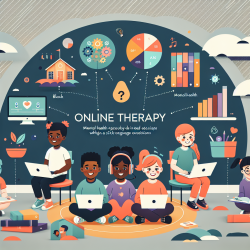Introduction
In the realm of speech-language pathology and caregiving, data-driven decisions are paramount. Recent research, such as the study titled "Enhancing Dementia Knowledge and Self-Efficacy of In-Home Supportive Services Caregivers Through Online Training," provides a compelling case for the efficacy of online training programs. This blog aims to explore the outcomes of this research and how practitioners can leverage these insights to enhance their skills and improve care outcomes.
The Importance of Training in Dementia Care
Dementia care is a complex field requiring specialized knowledge and skills. The study conducted by Fabius et al. (2022) underscores the significance of training programs in equipping caregivers with the necessary competencies to manage Alzheimer's disease and related dementias (ADRD). With the prevalence of ADRD projected to increase significantly, the demand for well-trained caregivers is more critical than ever.
Key Findings from the Research
The study implemented a 10-week online training program for In-Home Supportive Services (IHSS) caregivers in Alameda County, California. The results were promising:
- Increased Knowledge: Caregivers demonstrated a significant increase in dementia knowledge, with average correct responses on the Dementia Knowledge Assessment Tool 2 (DKAT2) rising from 11 to 15 out of 21 statements.
- Enhanced Self-Efficacy: Self-efficacy scores improved notably in both symptom management and community support service use domains.
- High Satisfaction: A remarkable 94% of caregivers expressed high satisfaction with the training, highlighting its perceived value and effectiveness.
Implications for Practitioners
For practitioners in the field of speech-language pathology and caregiving, these findings present several actionable insights:
- Adopt Online Training Models: The success of the online format suggests that remote training can be an effective tool for skill enhancement, especially in light of pandemic-related constraints.
- Focus on Self-Efficacy: Training programs should emphasize building caregivers' confidence in managing symptoms and utilizing community resources.
- Continuous Learning: Practitioners should advocate for ongoing training opportunities to keep pace with the evolving landscape of dementia care.
Encouraging Further Research
While the study provides valuable insights, it also highlights the need for further research. Future studies could explore the long-term impact of training on caregiver performance and consumer outcomes. Additionally, expanding training to other languages and regions could enhance accessibility and inclusivity.
Conclusion
The research on enhancing dementia knowledge and self-efficacy through online training offers a data-driven roadmap for improving caregiver competency. By embracing these findings, practitioners can contribute to better care outcomes for individuals with ADRD and beyond.
To read the original research paper, please follow this link: Enhancing Dementia Knowledge and Self-Efficacy of In-Home Supportive Services Caregivers Through Online Training.










